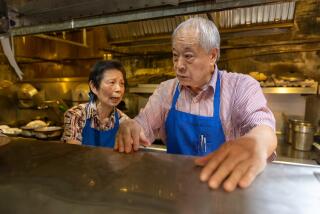My American Child of China
âIt ainât where ya from, itâs where ya at.â
Thirty years ago I came upon this witticism and wrote it down in my address book. Iâve pondered the words since. Am I right to wish they were true, knowing they arenât?
Thereâs bouncy all-American idealism here: Anybody can be somebody no matter where they started. You canât argue with that, as far as it goes.
But where one starts, way back, is no small concern either, and seems to be becoming a bigger deal all the time.
When I was a boy and my father was asked, he would say he was from Nevada. My mother would say she was from Utah.
At some point, it dawned on me that there was more to it. People would persist: What kind of a name is âBalzarâ? They didnât want to know where we were from geographically, but who we were ethnically.
Curiously, my fatherâs family lied about it.
We were Basques, they said. It was good to be Basque in Nevada. Basques were part of the stateâs rough-and-tumble beginnings, and they had odd names, and thatâs what I understood of it.
Then, after Iâd grown, we buried my grandmother in a family plot in Reno. An adjacent gravestone was marked âStefano Balzarini.â We were Italians.
It was just as good being Italian as Basque, as far as I was concerned. But it hadnât been good for my paternal grandmother. She was a WASP named Reed, and she was a mail-order bride; she came West from Indiana in 1906 to marry a man who worked for the railroad. Unfortunately, in her America an Italian was a step down. So the truth was not spoken while she lived.
My motherâs side of the family did not allow that kind of reinvention. They were Mormons, and they were precise about ancestry. My grandfatherâs two-volume handwritten genealogy traces the family tree back to medieval England. My forbears came to America on the Mayflower, and one of them signed the Mayflower Compact. In some quarters that stands one well in the pedigree department, although I never think to mention it when Iâm a guest at a Native American potlatch.
Ethnic heritage is on my mind again now. Thatâs because if all goes as planned, I will be flying into Changsha, China, today. This is Fatherâs Day. Iâm adding a page to the family genealogy and becoming a father for the second time.
Li Xing Guo, 18 months old, will be delivered across a room and passed from an orphanage caregiver into the arms of my wife and me. Itâs âgotcha day,â in the vernacular of adoptive families.
At that moment, Li Xing will become Gracie Anne. Daughter of China; our daughter.
The schedule has us concluding the paperwork and returning in time to grill hot dogs and celebrate the U.S.A. on the Fourth of July. She will arrive with a Chinese passport. But the instant she touches our soil, she will become an American citizen with a snipped-off last name that originated in Italy and once passed as Basque.
So how will this play out in her life? These 10,000 miles between where sheâs from and where sheâs at? Like all children, she begins with no say in parents or geography. She will toddle into a society thatâs ever more mixed but still apart, uneasy with its bloodlines and its memories.
We hope we can give her wisdom. She will learn about the complex heritage of China. And about African cultures because I spent an important part of my life there. And Finnish traditions because thatâs my wifeâs heritage. And Russia because her maternal grandfather is a Russian scholar. And naturally, like all Southern California girls, she will be shaped by Mexico. I want her to see culture through food, through art, through music, through history, through values, through celebrations and through awareness of suffering.
Sharing those things, we dearly hope, will enrich her understanding of the meaning of this country. Then, in 20 years or so, we can talk about the old adage in her fatherâs address book and see if weâve made progress.
More to Read
Sign up for Essential California
The most important California stories and recommendations in your inbox every morning.
You may occasionally receive promotional content from the Los Angeles Times.









